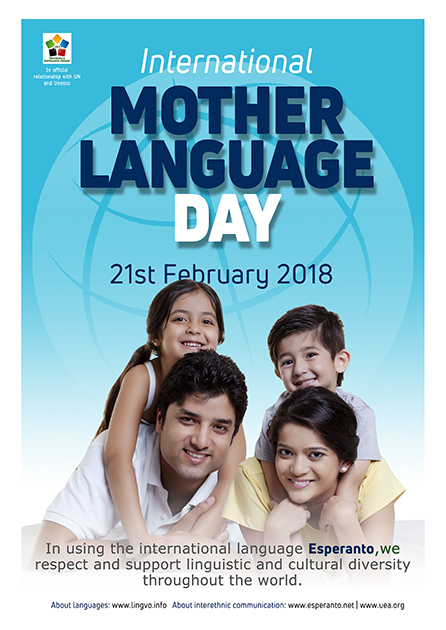|
Welcome to the website
of the movement for
Linguistic Human Rights
in the World
A place for
information, discussion
and action concerning
Linguistic Human Rights:
www.linguistic-rights.org
Lingvaj Rajtoj
Derechos Lingüísticos
الحقوق اللغوية
Droits Linguistiques
ЯЗЫКОВЫЕ ПРАВА
Linguistic Rights
语言权
언어권리
Sprachliche Rechte
Nyelvi jogok
حقوق زبانی
สิทธิทางภาษา
Diritti linguistici
Sproglige rettigheder
Jazyková práva
Taalrechten - taalrechtvaardigheid
|
albana | sq | Shqip
* angla | en | English
* araba | ar | العربية
* ĉeĥa | cs | Čeština
* ĉina | zh | 简体中文
dana | da | Dansk
* esperanta | eo | Esperanto
* farsia | fa | فارسی - Parsi/Farsi
* finna | fi | Suomi
* franca | fr | Français
germana | de | Deutsch
* greka | el | ελληνικά
* hispana | es | Español
* hungara | hu | Magyar
* itala | it | Italiano
nederlanda | nl | Nederlands
* pola | pl | Polski
* portugala | pt | Português
* serba | sr | Srpski/српски
* slovaka | sk | Slovenčina
sveda | sv | Svenska
* svahila | sw | Kiswahili
* taja | th | ภาษาไทย
* tajvana | zh/tw | 繁體中文
* turka | tr | Türkçe
albana | sq | Shqip
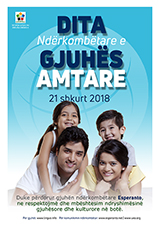
JPG, afiŝo | Facebook, reto
→
21 shkurt 2018
Dita Ndërkombëtare e Gjuhës Amtare
|
angla | en | English
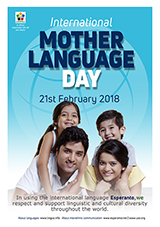
JPG, afiŝo | Facebook, reto
→
21st February 2018
International Mother Language Day
|
araba | ar | العربية
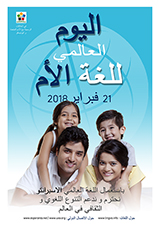
JPG, afiŝo | Facebook, reto
|
ĉeĥa | cs | Čeština
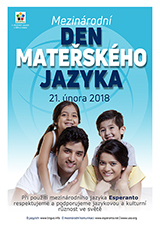
JPG, afiŝo | Facebook, reto
→ 21. února 2018
Mezinárodní den mateřského jazyka
|
ĉina | zh | 简体中文

JPG, afiŝo | Facebook, reto
→
2018年2 月21日
国际母语日
|
dana | da | Dansk
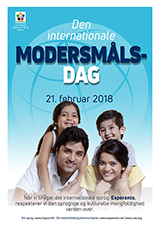
JPG, afiŝo | Facebook, reto
→
21. februar 2018
Den Internationale Modersmålsdag
|
esperanta | eo | Esperanto
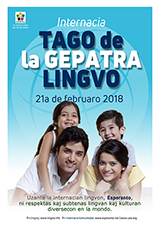
JPG, afiŝo | Facebook, reto
→
21a de februaro 2018
Internacia Tago de la Gepatra Lingvo
|
farsia | fa | فارسی - Parsi/Farsi
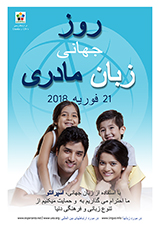
JPG, afiŝo | Facebook, reto
→ 21 فوریه 2018
روز جهانی زبان مادری
|
finna | fi | Suomi
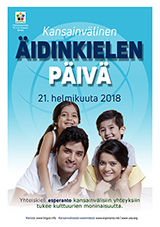
JPG, afiŝo | Facebook, reto
→
21 helmikuuta
Kansainvälinen äidinkielen päivä
(publikigota)
|
franca | fr | Français
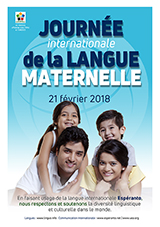
JPG, afiŝo | Facebook, reto
→
21 février
Journée internationale de la langue maternelle
|
germana | de | Deutsch
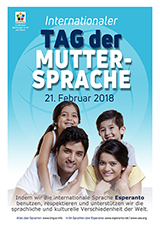
JPG, afiŝo | Facebook, reto
→
21. Februar
Internationaler Tag der Muttersprache
|
greka | el | ελληνικά
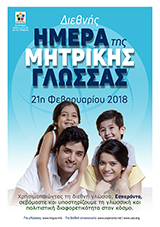
JPG, Afiŝo | Facebook, reto
→
21η Φεβρουαρίου
Παγκόσμια Ημέρα της Μητρικής Γλώσσας
|
hispana | es | Español
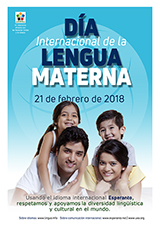
JPG, Afiŝo | Facebook, reto
→
21 de febrero de 2018
Día Internacional de la Lengua Materna
|
hungara | hu | Magyar
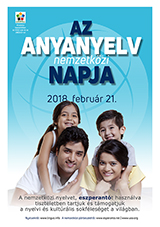
JPG, Afiŝo | Facebook, reto
|
itala | it | Italiano
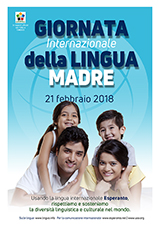
JPG, Afiŝo | Facebook, reto
→ 21 febbraio 2018
Giornata Internazionale della Lingua Madre
|
nederlanda | nl | Nederlands
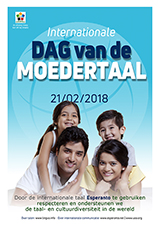
JPG, Afiŝo | Facebook, reto
→
21 februari 2018
Internationale Dag van de Moedertaal
|
pola | pl | Polski
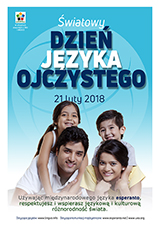
JPG, afiŝo | Facebook, reto
|
portugala | pt | Português
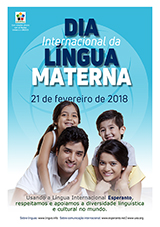
JPG, afiŝo | Facebook, reto
→
21 de fevereiro 2018
Dia Internacional da Língua Materna
|
serba | sr | Srpski/српски
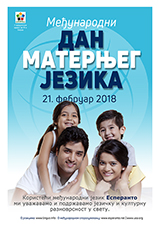
JPG, afiŝo | Facebook, web
→ 21. фебруар 2018.
Међународни дан матерњег језика
|
slovaka | sk | Slovenčina
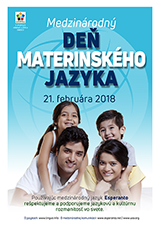
JPG, afiŝo | Facebook, web
|
sveda | sv | Svenska
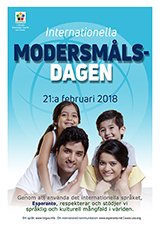
JPG, afiŝo | Facebook, web
|
svahila | sw | Kiswahili
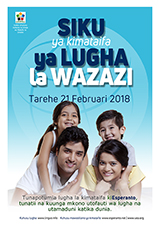
JPG, afiŝo | Facebook, web
→
Tarehe 21 Februari 2018
Siku ya kimataifa ya lugha la wazazi
|
taja | th | ภาษาไทย
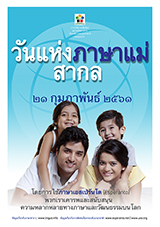
JPG, afiŝo | Facebook, web
|
tajvana | zh/tw | 繁體中文

JPG, afiŝo | Facebook, reto
→ 2018年2 月21日
國際母語日
|
turka | tr | Türkçe
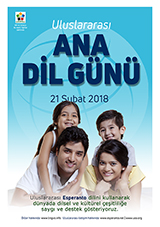
JPG, afiŝo | Facebook, web
→
21 Şubat 2018
Uluslararası Ana Dili Günü
|
..... | .. | .....
|
..... | .. | .....
|
..... | .. | .....
|
21st February 2018
International Mother Language Day
On the 21st February 1952, at the University of Dhaka, East Bengal, police shot dead a number of demonstrating students. Those students were demonstrating for people to acknowledge the existence of their mother tongue - Bengali (bangla / bn / বাংলা ভাষা). There was a move to remove that language from the university in favour of a "greater" language, spoken by the strong people of the time.
This is something which has been continually repeated - in various forms - all over the world and throughout history. Not only in East Bengal but also in several European countries. These are not unique events and there is the same logic: "I'm the strong one, so shut up, and if by any chance you want to speak, speak my language." In this way, little by little languages are disappearing and dying, and entire peoples are losing their intellectual treasure - a point made by many linguists also. This process gradually strengthen the position of English - to the detriment of local mother tongues.
Apart from the social injustice, which happens when anyone's mother tongue is disrespected, and psychological problems caused by disregard for an individual's mother tongue and insufficient knowledge of the imposed language, we should be aware of the fact that biological and linguistic diversity are inseparable, interconnected and dependent one upon the other. The loss of linguistic diversity brings about the loss of traditional knowledge which is essentially necessary for the continuance of biodiversity, for life. (Final declaration of the 64th UN DPI-NGO Conference, Bonn, 2011 (1); Terralingua (2))
On 17th November 1999 UNESCO proclaimed 21st February as the International Mother Language Day. In 2007 as well, the General Assembly of the UN (3) called on member states to "promote the preservation and protection of all languages used by peoples of the world", at the same time declaring 2008 as the International Year of Languages. (4)
In 2014 on its website, UNESCO also published an Esperanto version of the message from the General Director, Irina Bokova. (5)
What does this have to do with Esperanto? The two things are in fact related, because the core values of this day, multilingualism and the right of every person to speak his/her mother language, are also the values defended by the worldwide movement for Esperanto. We Esperantists do not want any language to disappear; we want all languages to continue existing, with respect for everyone's linguistic rights, and for linguistic justice to prevail. With this aim, for many years the Universal Esperanto Association (Universala Esperanto-Asocio, UEA) has solemnly co-celebrated this day, to underline among other things that Esperanto does not eliminate languages, unlike the way the languages of economic and military great powers do.
Esperanto, in fact, is a means of protecting against the disappearance of languages, as Mrs. Vigdís Finnbogadóttir (President of the Icelandic Republic, 1980-1996) said:
"It is time that the various nations understand that a neutral language could become a real bulwark for their cultures against the monopolistic influences of only one or two languages, as it now appears increasingly evident. I sincerely hope Esperanto will rapidly be making more progress to assist all of the world's nations." (6)
Perhaps someone is still asking: "Precisely why Esperanto?" The reason is simple. Behind Esperanto there are no states, economic systems, imperialistic struggles, nor peoples whose interest would be the elimination of other peoples, their languages, or the acquisition of their markets. Behind Esperanto there are only people of good will, who strive for justice for all cultures and all languages, in peace between the peoples.
"Strengthening the rights of speakers of all languages is a cause that Esperanto contributes to substantially." - Prof. Robert Phillipson. (7)
Esperanto is an instrument accelerating the attainment of just communication and thus of just relations between ethnic groups, cultures, people.
"I hope that Esperanto will continue fulfilling this dual role in promoting diversity and creating unity." - Rita Izsák-Ndiaye, Special Rapporteur of the UN on minority issues. (8)
Therefore, the use of Esperanto, a bridge language in international communication, makes linguistic equity possible and helps everyone to keep their own language alive. This is the clear message which Esperanto-speakers from the whole world want to send to everyone worldwide, on 21st February.
- Get to know the international language, Esperanto at www.lernu.net! (9)
→ Declaration of the Universal Esperanto Association ←
on the occasion of
International Mother Language Day, 21 February 2018
The UEA Information team (10)
Renato Corsetti, Stefano Keller, Emilio Cid, Vasil Kadifeli and others
Posters: © Peter Oliver/UEA and translators from different countries
www.linguistic-rights.org/21-02-2018
1) www.linguistic-rights.org/dokumento/Final_declaration_64th_UN_DPI_NGO_Conference_Bonn_2011_amendments_Universala_Esperanto_Asocio_UEA.pdf (archive copy of the UN document: PDF)
2) www.terralingua.org/our-work/linguistic-diversity
3) www.un.org/en/events/motherlanguageday
4) 2008 - International Year of Languages | http://www.un.org/en/events/iyl/
5) www.unesco.org/new/en/unesco/events/prizes-and-celebrations/celebrations/international-days/international-mother-language-day-2014 (archive copy of the UNESCO webpage: PDF)
6) http://www.linguistic-rights.org/uea/Justa_Komunikado_Lingva_Justeco_Vigdis_FINNBOGADOTTIR_prezidento_de_la_Respubliko_Islando_1980_1996.pdf
7) www.linguistic-rights.org/esperanto-125/Dr-Robert-Phillipson-Professor-emeritus-125-years-of-Esperanto.html - also recommended: Dr. Tove Skutnabb-Kangas
8) www.linguistic-rights.org/esperanto-125/Rita-Izsak-UN-independent-expert-on-minority-issues.html
9) www.lernu.net
10) Universala Esperanto-Asocio (UEA) - www.uea.org
|
|
العربية | Беларуская | Dansk | Deutsch | English | Español | Esperanto | فارسی | Français | Gaeilge
Bahasa Indonesia | Íslenska | 한국어 | Italiano | Magyar | Nederlands | Português | по-русски
Slovenčina | Српски | తెలుగు | Türkçe | Українська | 语言权
© 2008-2018 Agado por Lingvaj Rajtoj, UEA
Reguloj pri utiligo | Privateco | Leĝe | Kontakto
traduko | informado | retejmapo

|


























